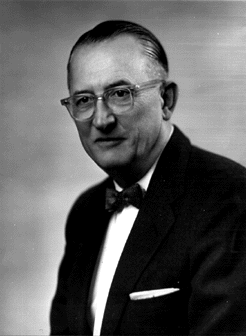George P. Larrick
George P. Larrick was an influential figure in the history of the United States Food and Drug Administration (FDA), serving as its commissioner from 1954 to 1965. His tenure was marked by significant advancements in the regulation of pharmaceuticals, food safety, and cosmetics, reflecting a period of transformation and heightened consumer protection in the United States.
Born in the early 20th century, Larrick's career at the FDA began in the 1930s, a time when the agency was still developing its regulatory framework. His rise through the ranks was a testament to his dedication to public health and safety. By the time he was appointed commissioner by President Dwight D. Eisenhower, Larrick had already established himself as a capable and knowledgeable leader within the agency.
During his time as commissioner, Larrick oversaw the implementation of several key pieces of legislation that would have a lasting impact on the FDA and its regulatory authority. One of the most notable was the 1962 Kefauver-Harris Amendment to the Federal Food, Drug, and Cosmetic Act, which was prompted by the thalidomide tragedy. This amendment significantly strengthened the FDA's control over drug safety, requiring that manufacturers prove the efficacy and safety of their drugs before approval. Larrick's leadership was crucial in the enactment and enforcement of this legislation, which marked a turning point in drug regulation in the United States.
Larrick also played a pivotal role in addressing concerns related to food additives and pesticides, which were becoming increasingly prominent issues during the 1950s and 1960s. His efforts contributed to the enhancement of food safety standards and the promotion of public health awareness.
After leaving the FDA in 1965, Larrick continued to be involved in public health and regulatory affairs, contributing his expertise to various organizations and initiatives. His legacy at the FDA is remembered as one of dedication to improving the safety and efficacy of products available to the American public, and his work laid the groundwork for many of the regulatory practices and standards in place today.
George P. Larrick[edit | edit source]
Search WikiMD
Ad.Tired of being Overweight? Try W8MD's NYC physician weight loss.
Semaglutide (Ozempic / Wegovy and Tirzepatide (Mounjaro / Zepbound) available. Call 718 946 5500.
Advertise on WikiMD
|
WikiMD's Wellness Encyclopedia |
| Let Food Be Thy Medicine Medicine Thy Food - Hippocrates |
Translate this page: - East Asian
中文,
日本,
한국어,
South Asian
हिन्दी,
தமிழ்,
తెలుగు,
Urdu,
ಕನ್ನಡ,
Southeast Asian
Indonesian,
Vietnamese,
Thai,
မြန်မာဘာသာ,
বাংলা
European
español,
Deutsch,
français,
Greek,
português do Brasil,
polski,
română,
русский,
Nederlands,
norsk,
svenska,
suomi,
Italian
Middle Eastern & African
عربى,
Turkish,
Persian,
Hebrew,
Afrikaans,
isiZulu,
Kiswahili,
Other
Bulgarian,
Hungarian,
Czech,
Swedish,
മലയാളം,
मराठी,
ਪੰਜਾਬੀ,
ગુજરાતી,
Portuguese,
Ukrainian
Medical Disclaimer: WikiMD is not a substitute for professional medical advice. The information on WikiMD is provided as an information resource only, may be incorrect, outdated or misleading, and is not to be used or relied on for any diagnostic or treatment purposes. Please consult your health care provider before making any healthcare decisions or for guidance about a specific medical condition. WikiMD expressly disclaims responsibility, and shall have no liability, for any damages, loss, injury, or liability whatsoever suffered as a result of your reliance on the information contained in this site. By visiting this site you agree to the foregoing terms and conditions, which may from time to time be changed or supplemented by WikiMD. If you do not agree to the foregoing terms and conditions, you should not enter or use this site. See full disclaimer.
Credits:Most images are courtesy of Wikimedia commons, and templates, categories Wikipedia, licensed under CC BY SA or similar.
Contributors: Prab R. Tumpati, MD



